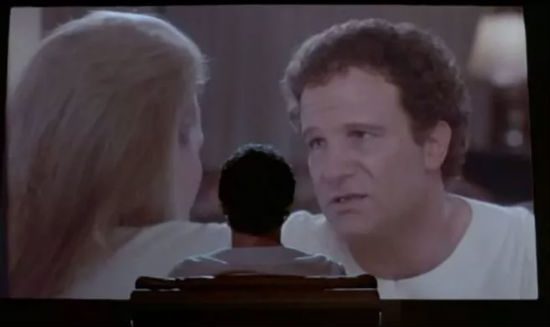A recent Twitter discussion around the hashtag #ChristianAltFacts included this stroll down memory lane courtesy of Micah J. Murray, who recalled being taught that: “After you die, God will replay your whole life on a giant projector screen in the afterlife and all humans ever will see your secret sins.”
I remember hearing this from various speakers and teachers at church youth group, Christian school, and Bible camp. I remember it because it worked — because it had its intended effect on me as an evangelical teenager. The idea wasn’t just that God sees all that you do, even in secret, but that some day, in Heaven or at the Last Judgment, everyone will see all that you do, even in secret. Your parents will see. All of your neighbors. That cute girl in sixth-period algebra. Everyone.

The general idea — “be sure your sins will find you out” — isn’t bad on its own, but this idea was always tangled up in the distorted, misleading, and individualistic notions we all had of what “sin” entailed. This Last Judgment film festival wouldn’t be anything like the biblical picture of a final judgment in Matthew 25. The sins that story lists are very specific: I was hungry and you did not feed me, I was thirsty and you gave me nothing to drink, I was homeless and you gave me no shelter, I was sick and in prison and you never cared for me. Those sins were nowhere in the discussion and nowhere in our imagination when we were asked to contemplate the future shame of our secret sins being revealed to all the world.
Mainly, it was about lust. The way we read the Bible, this was the main sin we had to worry about. The Bible, as we viewed it, was mainly concerned with two big sins: lust and idol-worship. As suburban American teenagers, we were pretty good about not sacrificing animals to Baal, but lust was a more tempting temptation.
And by lust and “secret sins,” let’s be clear, what all those youth group retreat and school chapel speakers really meant was masturbation. This was quite often the subtext of all evangelical youth-group discussions of “discipleship” and “spiritual growth.” The question “How is your walk with the Lord?” was almost a euphemism for “Are you still master of your domain?”
Again, this weird, speculative notion of all our “secret sins” being projected on a giant screen, revealed to everyone who ever lived did accomplish its intended goal of making us all a bit leery of the secret sin in question. It is discomfiting to contemplate that everyone you know — your classmates, your parents, your neighbors, your youth minister — will one day see you doing that. The prospect of such mortifying embarrassment at the Last Judgment probably discouraged us, a bit, from committing the sin in question. (If only a bit because, after all, we were still teenagers.)
But if we take this idea seriously, accepting the Secret Sins Film Festival as a formal eschatological doctrine, then I think ultimately it would have the opposite effect from what all those speakers intended. Their goal was to cultivate and harness shame, but I don’t think shame would last very long in this process. And the more I think about the implications of this dazzlingly weird, poorly thought-out cudgel of a sermon illustration, the more I’m warming to the idea, not as an instrument of shame, but as an instrument of grace.
The logistics of this are difficult to imagine, since everyone is going to have to sit through all of everyone else’s Secret Sins documentaries. That’s such a long, boring prospect that this almost begins to look like a kind of evangelical doctrine of Purgatory. But let’s stipulate that there’s some heavenly mechanism to account for that, some kind of timey-wimey eternity factor that would enable all 20 billion or so of us humans who have ever lived to sit through all 20 billion of these X-rated secret-sin biopics.
Somebody would have to be first, and that would be unpleasant for them. All the shame and humiliation imagined by all those youth-group speakers would, initially, fall pretty hard on whoever’s Judgment Day movie was the first one projected up on that heavenly screen. But then there’d be another movie about the next person, and one after that, and one after that. And fairly quickly, some patterns would emerge, evolving into running jokes. It wouldn’t take long — 20 or 30 of these, at the most — for any shame associated with the “secret sin” in question to dissipate completely.
Having your secret sins revealed to everyone else who ever lived seems like it would be the absolute depth of shame, but the audience here would be others who also had (or are about to have) all of their secret sins revealed too. When the first movie starts, every 20th-century American evangelical teen might be terrified at the prospect that Mary and Moses and their parents and pastors and all of the popular kids at their school are about to see them masturbating, but after the first few million of these movies, nobody’s going to care about that. Not after we all just sat through some eternity-equivalent of months or years having to watch Elijah and Gregory VII and Billy Sunday and all of our grandparents doing the same thing.
Ultimately, I think, we’d all begin to discover that this Secret Sins Film Festival was not really an exercise in shame and judgment, but rather a kind of odd lesson into seeing one another the way that only God is able to see us. It would allow us — and in some ways even enable us — to finally love one another fully because, for the first time, we would finally know one another fully. We would learn what grace entails, and what grace requires, and we would thereby also learn to extend it to others — to freely give as we would freely receive.
Granted, it’s easier to think this when we’re considering that one minor sin that preoccupies so much of evangelical youth-group culture — a sin that, when it’s even a sin at all, usually has as much to do with gluttony and sloth as it does with lust. But this idea of a shame-inducing Secret Sins Film Festival also includes other, graver matters. After all, nobody — not even an evangelical teenager — really believes that masturbating is the worst thing they’ve ever done. We all have other things, far more serious things, we’re legitimately ashamed of — acts of cruelty, or cowardice, or neglect.
I imagine if you had to sit through a comprehensive video compilation of all the shameful things I’ve done, you would be rightly disgusted by me. And of course if I had to sit through a similar Sin Movie about your worst moments, I might feel the same way about you. But if we both also saw all the same things about everyone else — everyone we’ve ever admired, or known, or loved, as well as billions of strangers we’d never even heard of — the overwhelming cumulative revulsion, sadness, and disappointment we would feel would break into an overwhelming generosity and forgiveness, simply because of the vast, universal need for it.
I recognize that’s all primed to careen off into endless variations of “Yeah, well what about Hitler? Huh? How would this scheme account for Hitler?” The answer there is that I don’t know how to account for monstrous evil, for any of the superlative cases that spring to mind when we we contemplate the unforgivable. But I think I’d be closer to knowing how to account for that after watching all 20 billion of these movies, seeing and knowing and understanding the lives of all of them, victims and perpetrators alike.
It’s all nonsense anyway, this idea that “God will replay your whole life on a giant projector screen in the afterlife and all humans ever will see your secret sins.” If there is any such thing as an afterlife, this youth-minister’s fever-dream won’t be a part of it. And here in this life we haven’t the time or the capacity to see or to learn or to understand everything about everyone else. We’re barely able to see or understand much of anything even about ourselves as we stumble through the “movie” of our own lives firsthand.
But what if we could?
















